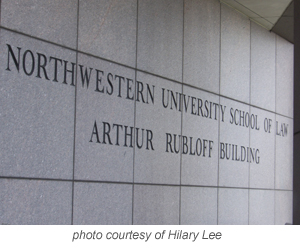Interview with Former Dean David E. Van Zandt of Northwestern University School of Law
Published September 2008, last updated May 2009
How would you describe the ideal candidate for Northwestern University School of Law?
 Our top applicants definitely share some key attributes. In addition to strong academic abilities, they have solid interpersonal and communication skills, which are necessary for success in our very collaborative, team-based curriculum. They are forward-thinking, and appreciate that a traditional legal education paired with an emphasis on communication, presentation, problem-solving skills and cross-training in management, will lay the groundwork for their career success regardless of the sector in which they ultimately practice. They have already demonstrated through post-college work that they can function effectively on teams and are capable of completing projects effectively. They are ambitious and mature, and the substantial work experience that they bring provides real-world perspectives for fellow students. We look for applicants who have sound judgment and demonstrate respect for differing ideas and backgrounds. Additionally, an ideal candidate values our intimate community, and is attracted to and appreciates the benefits of our supportive—not competitive—atmosphere.
Our top applicants definitely share some key attributes. In addition to strong academic abilities, they have solid interpersonal and communication skills, which are necessary for success in our very collaborative, team-based curriculum. They are forward-thinking, and appreciate that a traditional legal education paired with an emphasis on communication, presentation, problem-solving skills and cross-training in management, will lay the groundwork for their career success regardless of the sector in which they ultimately practice. They have already demonstrated through post-college work that they can function effectively on teams and are capable of completing projects effectively. They are ambitious and mature, and the substantial work experience that they bring provides real-world perspectives for fellow students. We look for applicants who have sound judgment and demonstrate respect for differing ideas and backgrounds. Additionally, an ideal candidate values our intimate community, and is attracted to and appreciates the benefits of our supportive—not competitive—atmosphere.
What does the admissions process consist of, and how is an application rated?
In addition to the items that most law schools require – data form, personal statement, and an LSDAS report—we are the only law school that strongly encourages every applicant to interview (if an applicant is applying straight from college, he or she must have an interview). Our community and educational programs are highly interactive and, when our students graduate, they will embark on jobs and careers that require strong interpersonal and communication skills. The interview is the best place for us to determine these qualities. Our admissions interviews can take place on campus with a member of our admissions staff or with a current student, or off campus with one of more than 750 alumni interviewing volunteers.
We also insist on substantial post-undergraduate work experience and require one letter of recommendation, ideally from an employer. While we accept a standard letter, we also have our own form and prefer that applicants use it instead of a general recommendation. Other than the interview, we do not rate the individual parts of the application. We use a numeric scale to rate each applicant along a set list of criteria – things like intellectual ability, interpersonal and communication skills (verbal and written), career progress and focus, leadership and project management experience, and motivation for Northwestern Law.
 How are JD/MBA applications treated? What happens if an applicant would individually be a strong candidate for one program, but not another, such as when there is a large disparity in LSAT and GMAT scores?
How are JD/MBA applications treated? What happens if an applicant would individually be a strong candidate for one program, but not another, such as when there is a large disparity in LSAT and GMAT scores?
We have the largest and most integrated JD-MBA program in the nation, and it’s the only three-year program among the top schools. Similarly, the admissions process consists of a single application, a single exam—the GMAT in our case since it includes both verbal and quantitative sections—and a single decision. Each application is reviewed by the Admissions Committees of Kellogg and the Law School. If the initial decisions are the same -- and in most cases they are – we send out a joint decision letter. If they differ, we get together and discuss it and arrive at a common decision. Each school reserves the right to admit an applicant individually to its own degree program, but cases like that are extremely rare.
There are some aspects of Northwestern's application process that are somewhat unique. Could you expand upon the role the interview plays? Will it make or break an application?
As I mentioned before, we are the only law school in the country that attempts to interview everyone who applies in order to assess their interpersonal and communication skills, as well as their fit in our community. We are also alone in our efforts to ensure that every student enters with substantial post-undergraduate work experience. In fact, in the class that just arrived, 97 percent had at least a year of experience, more than 80 percent had at least two years, and about 60 percent had three or more years.
Interviews are very important, and a poor interview can break an application, regardless of the grades or LSAT scores. On the other hand, a good interview is not enough to overcome a subpar academic record. Like all the top law schools, a strong academic record is essential, but we look for more than that. We also evaluate our applicants on things like career focus, teamwork, and project management; I doubt that any other law school really takes those kinds of things very seriously. All of these factors make a huge difference in helping us create and sustain a team-oriented culture. They also help us ensure that our students have the maturity, good judgment, and other abilities that their future employers want.
What are admissions staff looking for in a good personal statement?
 The reality is that we get a lot more information from the interviews than we do from the personal statements. Obviously, the personal statement needs to be well-written, but you never know how original it is or how much help the person received. In the end, it is about the substance – what someone has accomplished up to this point – not the way they write about it. Like all of the other parts of the application, the bottom line is that we are looking for evidence that demonstrates strong leadership potential and the ability to succeed in what will be a multi-job career. As a result, examples of past leadership experiences, management of complex projects, or situations that involve overcoming obstacles or challenges tend to be the most useful. The personal statement should not be generic. It needs to be tailored to Northwestern Law in the same way that you would show interest if you were applying for a job. It’s important to show that you have done some research about us, that you understand how we are different, and that you affirmatively want to be a part of our community.
The reality is that we get a lot more information from the interviews than we do from the personal statements. Obviously, the personal statement needs to be well-written, but you never know how original it is or how much help the person received. In the end, it is about the substance – what someone has accomplished up to this point – not the way they write about it. Like all of the other parts of the application, the bottom line is that we are looking for evidence that demonstrates strong leadership potential and the ability to succeed in what will be a multi-job career. As a result, examples of past leadership experiences, management of complex projects, or situations that involve overcoming obstacles or challenges tend to be the most useful. The personal statement should not be generic. It needs to be tailored to Northwestern Law in the same way that you would show interest if you were applying for a job. It’s important to show that you have done some research about us, that you understand how we are different, and that you affirmatively want to be a part of our community.
How cognizant are the admissions staff and the administration of the chatter that goes on about schools on forums like Top-Law-Schools.com, and how much does it influence how the school operates?
We are aware of the chatter. The discussion boards do not affect the things we do, but our admissions team occasionally does follow threads that are relevant to us – mainly to keep a pulse on what applicants are thinking and what they are saying about us. We do get some useful information that way.
Northwestern has a reputation in some circles, rightly or wrongly, for applying a "business school" approach to law school. Some more academically inclined people are critical of this approach. How do you respond to those criticisms?
In one way, I do not see this as a criticism. If some of our sister professional schools have good ideas, then we should borrow them. Some of our innovations have been suggested by the practices of our medical school colleagues as well as our business school.
More importantly, however, the criticism is based on a false assumption that somehow excellent lawyers and other successful people do not share many of the same traits. We focus on the abilities and competencies, I call them “foundational competencies”, that all of our students will need to be successful throughout their multi-job careers in any sector whether it is private, governmental, or non-profit. Of course, a core competency of any lawyer must be the ability to engage in legal analysis and legal argumentation, but in today’s world that is no guarantee of success. You must be able to use your legal knowledge effectively in a wide range of contexts. You must be able to function well on and lead teams as well as successfully manage projects. You must understand your client’s strategy and what your client—whether an individual or an organization—is trying to accomplish with your help. Finally, you must be able to communicate both verbally and in written form not only with other lawyers but also with other teammates who bring their own expertise to the problem at hand.
 What is most important to me and should be important to any applicant is that the employers of our graduates consistently confirm that they value the things we are doing – whether it is interviewing applicants, requiring previous work experience among our students, emphasizing teamwork and strong communication skills or providing cross-training in management-related concepts. Our research and input from industry leaders in both the public and private sectors consistently support our approach. In fact, when we conducted our focus groups throughout the country and in London for Plan 2008 this past year, I was somewhat surprised by how strongly even the government and non-profit leaders affirmed the need for things like strong quantitative skills and strategic understanding.
What is most important to me and should be important to any applicant is that the employers of our graduates consistently confirm that they value the things we are doing – whether it is interviewing applicants, requiring previous work experience among our students, emphasizing teamwork and strong communication skills or providing cross-training in management-related concepts. Our research and input from industry leaders in both the public and private sectors consistently support our approach. In fact, when we conducted our focus groups throughout the country and in London for Plan 2008 this past year, I was somewhat surprised by how strongly even the government and non-profit leaders affirmed the need for things like strong quantitative skills and strategic understanding.
In the eyes of employers, our graduates already stand out as better prepared to succeed in an increasingly competitive world. As our graduates continue to differentiate themselves in the workplace, I think that we will begin to see other schools adopting a similar approach. The marketplace has changed, and globalization means that most law school graduates will need to work strategically with lawyers and non-lawyers across organizational, institutional and global boundaries. Competencies like communication, teamwork, quantitative skills, project management and leadership—along with traditional case law analysis—will prepare students to better help their future clients and organizations.
There has been much talk recently about Northwestern's new accelerated JD program. Could you explain how the idea for this program came about, what influenced the school to implement it, and what influence employer opinions have had in shaping the program?
The Accelerated JD program is a component of our recently announced “Plan 2008: Preparing Great Leaders for the Changing World.” The plan was developed by a working group comprised of faculty, students, alumni, and staff, and assisted by Blaqwell, Inc. (a legal consulting firm). It is based on extensive research on industry trends and input from leaders whose decisions affect those trends. Managing partners, general counsel and other leaders of the top law firms, corporations, government offices and nonprofits shared their perspectives in focus groups across the U.S. and in London. To my knowledge, we are the only law school that has undertaken such a comprehensive effort to understand the legal market by listening to those who employ and work with graduates.
Plan 2008, an extension of our 1998 strategic plan, emphasizes the foundational competencies that most law schools ignore, but that industry leaders agree are critical for success in today’s legal careers. The Accelerated JD is designed to attract students who already have many of these abilities based on their work experience, and then use innovative programs to further develop those foundational competencies—communication, teamwork, strategic understanding, basic quantitative skills, cross-cultural work, project management and leadership—that will help them succeed in multi-job careers.
We are also leveraging on the success of our JD-MBA program, which we compressed to three years in 2000. We anticipate that the Accelerated JD will be equally effective in attracting a subset of highly-motivated students who perceive the value of re-entering the workforce earlier than they would in a traditional three-year JD program.
There is a belief that during economic downturns, more people apply to graduate school programs, both professional and otherwise. Is this true, and if so how much impact do you believe it will have on the admissions process in the short term, and the number of graduates compared to the number of jobs in the long term?
The statistics support this, and we do expect to see an uptick in applications this year. In the past, law schools have not expanded their class sizes during economic downturns, and I do not expect to see an increase in law school graduates during the next couple of years. That would not make sense since market demand ultimately will drive the supply of graduates.
Our strategy has been clear—to distinctively prepare our graduates with the abilities employers need and better prepare them compared to graduates of other law schools. That requires constant communication with potential employers and an ability to quickly and constantly innovate in ways that are relevant to them. As long as we continue to do that, we will shield our graduates from swings in the economy. That was the case during the most recent recession, when the employment rates of our students did not change at all. Our unique admissions process and our curriculum, which instills teamwork, communication and presentations skills, and cross-training in management, are all designed with this in mind. We listen very closely to potential employers when making decisions around here.
Periodically there is much wailing and gnashing of teeth over the US News rankings and methodology. How much stake should an applicant or employer put in them, and is there a better solution for measuring the "quality" of an institution?
I feel strongly that rankings are an important form of consumer information about a significant investment of time and money—the biggest investment of many law students’ lives. My position, which is not universally shared among my peers, has always been that U.S. News rankings offer invaluable comparative data to anyone trying to make an informed choice. Many law school applicants take on substantial debt to pay for a legal education (often over $150,000) and devote three years of their lives to pursuing a law degree. No ranking is perfect, and reasonable people can disagree about how data is put together; if I was putting together the information to create a ranking, I would do it differently that U.S. News has done. Still, the U.S. News rankings do provide valuable information for consumers of what we law schools do. I think it is hypocritical and patronizing for us in legal education to assume that our future students lack sufficient judgment and thinking ability to be able to give such rankings the appropriate weight in their decision about which law school to attend. U.S. News, along with other media, has capitalized on the need to provide the information that applicants deserve to make a law school choice.
Interview with Edward Tom, Former Dean of Admissions U.C. Berkeley Boalt Hall School
Interview with Richard Geiger, Former Associate Dean and Dean of Admissions for Cornell Law School
Interview with Former Dean David E. Van Zandt of Northwestern University School of Law
Interview with Former Dean Robert Berring of Boalt Hall
Interview with Former Dean Sarah Zearfoss University of Michigan Law School
Interview with Professor Brian Leiter
Interview with Former Dean Victoria Ortiz UC Irvine School of Law
Interview with Former Dean Donald Polden of Santa Clara
Interview with Former Dean Jeanette Leach of Admissions to Santa Clara University's School of Law
Interview with Santa Clara Law School Former Assistant Dean Alexandra Horne
Interview with Former Dean Hasl of Thomas Jefferson School of Law
Interview with Joan Howland, Former Associate Dean at the University of Minnesota
Interview with Former Dean Evan Caminker of University of Michigan Law School
Interview with Former Dean Erwin Chemerinsky UC Irvine School of Law
Interview with Former Dean Jason Trujillo of UVA Law
Interview with Former Dean Stewart Schwab of Cornell Law School
Interview with Ann Perry of The University of Chicago Law School
Interview with Johann Lee at Northwestern University Law School
Interview with Kevin Johnson UC Davis Law
Interview with Former Dean Robert Rasmussen of USC Law
Interview with Dr. Karen Reagan Britton, UT Law
Interview with Dean Doug Blaze, UT Law
Interview with Jannell Roberts, Former Associate Dean of Admissions at Loyola Law
Interview with Susan L. Krinsky, Former Associate Dean of Admissions at Tulane Law
Interview with Faye Shealy, Former Associate Dean of Admissions at William & Mary Law School
Interview with Robert H. Jerry, II, Former Dean & Levin Mabie and Levin Professor of Law
Interview with Former Dean Earl Martin of Gonzaga Law
Interview with Stephen Brown, Associate Dean of Admissions at the Fordham University School of Law
Interview with Jacqlene Nance, Former Director of Admissions at the University of Kansas School of Law
Interview with Former Dean Robert Schwartz at UCLA School of Law
Interview with Matthew Diller, Former Dean and Professor of Law at Benjamin N. Cardozo School of Law
Interview with Andy Cornblatt, Dean of Admissions at Georgetown University Law Center (GULC)
Interview with Chris Guthrie, Dean of the Vanderbilt University Law School
Interview with G. Todd Morton, Assistant Dean and Dean of Admissions for Vanderbilt University Law School
Interview with Susan Lee, Former Director of Admissions at Gonzaga University School of Law
Interview with Arizona State University Sandra Day O’Connor College of Law Former Dean and Foundation Professor of Law – Paul Schiff Berman
Interview with Alissa Leonard, Director of Admissions and Financial Aid at the Boston University School of Law
Interview with David Partlett, Former Dean of Emory University School of Law
Interview with Michelle Rahman, Former Associate Dean for Admissions at the University of Richmond School of Law
Interview with Isabel DiSciullo, Former Assistant Dean of Admissions for Drexel Law
Published July 2010 Introduction Top-Law-Schools.com would like to thank Asha Rangappa, Associate Dean for Admissions at Yale Law School, for taking the time to answer our questions! TLS: Since becoming Associate Dean in 2007, you have reached out to th
Interview with Josh Rubenstein, Former Assistant Dean for Admissions at Harvard Law School
Interview with Renee C. Post at the University of Pennsylvania School of Law
Interview with Former Dean Rita C. Jones of Boston College Law School
Interview with S. Brett Twitty, Former Director of Admissions, W&L Law
Interview with Lillie V. Wiley-Upshaw, Vice Dean for Admissions and Financial Aid, University at Buffalo Law School
Interview with Nikki Laubenstein, Director of Admissions at Syracuse University College of Law
Interview with Janet Laybold, Former Associate Dean, Admissions, Career and Student Services, Washington University School of Law
Interview with Anthony Crowell, Former Dean of New York Law School
Interview with Jessica Berg and Michael Scharf, Former Co-Deans of Case Western Reserve University School of Law
Interview with Alyson Suter Alber, Associate Dean for Enrollment Planning and Strategic Initiatives, Case Western Reserve University School of Law
Interview with Jeffrey A. Dodge, Former Associate Dean of Students, Academic Affairs & Administration, University of Idaho College of Law
Interview with L. Pilar Mensah, Assistant Dean for Admissions; Sondra R. Tennessee, Associate Dean for Student Affairs; and Tiffany J. Tucker, Assistant Dean for Career Development, University of Houston Law Center
Interview with Jay L. Austin, Former Assistant Dean, Admissions and Student Financial Services, UC Irvine School of Law
Interview with Mathiew Le, Former Assistant Dean of Admissions & Financial Aid, University of Washington School of Law
Interview with Daniel M. Filler, Dean and Professor of Law, Drexel University, Thomas R. Kline School of Law
Interview with Donald Tobin, Dean and Professor of Law, the University of Maryland Francis King Carey School of Law
Interview with Amy Mangione, Assistant Dean and Director of Admissions, Albany Law School
Interview with Christopher J. Peters, Former Dean and Professor of Law, The University of Akron School of Law
Interview with Carla Pratt, Dean and Professor of Law, Washburn University School of Law
Interview with Michelle Rahman, Associate Dean for Admissions, the University of Richmond School of Law
Interview with Verna Williams, Interim Dean and Nippert Professor of Law, the University of Cincinnati College of Law
Interview with Allen Rostron, Former Associate Dean for Students and the William R. Jacques Constitutional Law Scholar and Professor of Law, University of Missouri-Kansas City School of Law
Interview with Faye Shealy, Former Associate Dean for Admission, William & Mary Law School
